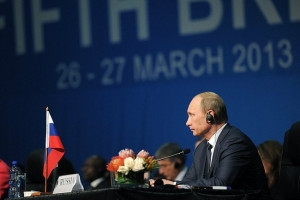
As for the post-Soviet states, they have been more or less successfully getting used to the “status of buffer states” for more than twenty years, searching for their places in the international arena, while playing on the contradictions between the major global actors and trying to manipulate them to their advantage. Constant tactical manoeuvring of the CIS countries in this “buffer zone”, which they have formed, led to the fact that the old post-Soviet integration of economical, technological and cultural resources are now exhausted, and the absence of a stable foreign policy orientation makes it impossible to attract foreign investments – Russian, European, Turkish, Chinese, etc. However, the continued existence in this inertial phase of a political multi-vector nature is impossible, as it is impossible to continue living at the expense of the resource legacy of Soviet times. Therefore, the situation of wandering between different centres of geopolitical influence led to the fact that the resource potential of the Soviet era cannot ensure the full functioning of state organisms of post-Soviet states, and raises the question on the choice of the development vector.
The modern world is formed into large geopolitical blocks. Ultimately, the socio-political degradation, demoralization of social elites and society, the failure of the nation-state projects are waiting for those countries that turn a blind eye to the ongoing processes. That is why integration – is an imperative for the entire post-Soviet space: a transformation into a new type of a state, whose main objective is uniting of resources to counter threats and challenges of the modern era. It is necessary to create a common market in the Eurasian space, to revive production chains within a single customs space, to move from the economy of commodity rents to an economy of creating added value. Financial and economic crises have shown that countries with weak economic potential and low production of added value are the most vulnerable in the competitive global market.
A special role in the creation of the Eurasian Union belongs to Ukraine, which Russia needs in order to restore economic ties between the two countries as the basis for their modernization and development through the implementation of innovations. However, Ukraine is necessary to the Russian Federation not only in terms of its industrial potential. Ukraine is one of the largest countries, it concedes nothing to the majority of European countries in terms of economic and demographic potential. In the projected Eurasian Union, the role of Islamic vector, in which Kazakhstan and the Central Asian states will play a decisive role, will be increased without the participation of Ukraine. Ukraine is important for the Eurasian Union not only in terms of the development of trade, economic and financial ties, but also to preserve the ethnic composition of the optimal future of the formation, because this is a Slavic Orthodox country, which ethnically and religiously is the closest to the main Russian ethnicity.
When the concept of the Eurasian Union of V.V. Putin is realized, it is most important for Russia to create internal and external security zones, in the context of a continued critical level of instability and turbulence of socio-political processes in the Arab-Islamic world.
Another important thing to consider in Russia’s Eurasian strategy is to create a mechanism of control over migration flows. Russia needs labour. A Deficit of an unskilled workforce is compensated with an influx of migrants from Central Asia. This is an economic problem that should be solved in an integrated space of the future Eurasian Union. Today, migration flows alter the ethnic Russian picture of urban landscapes, change the socio-economic structure of Russian cities, and exacerbate inter-ethnic relations and weaken the institutions of statehood. Therefore, Russia must make determined efforts towards intensification of the integration processes with a goal of the development of industry and agriculture in post-Soviet states, to secure labour in their territories.
As it appears, the formation of geopolitical space of the Eurasian Union should be in the following sequence:
1. Consolidation of Russian hinterlands based on the development of economic, transport and informational connectivity of constituent entities of the Federation.
2. Confessional and cultural consolidation of Russia’s nations.
3. Creation of a near buffer zone from the post-Soviet states, as areas of direct Russian economic and political influence.
4. Formation of an outer buffer zone of economic and political cooperation, to jointly counter challenges and threats of the modern world.
The advancement of the concept of a Eurasian Union, made by V.V. Putin, is a reflection of the fact, that the time has come for a new type of formations – neo-empires, which are constructed on the basis of a supranational vertical of power, as well as a cultural and religious doctrine as a common ideological basis for such association.
The structure of the Eurasian Union should include three components:
– the core of the Union represented by the Russian Federation in its present borders;
– near zone of the Union, including the CIS countries, which are united by specially created supranational institutions;
– external geopolitical space, structured around the main poles of the political and economic, religious and cultural influences (China, India, Pakistan, Iran and Turkey).
Within the framework of the Eurasian Union, is expedient to establish an international structure – something like the “Eurasian Forum”, whose founders should all be members of this union and represent its core. The establishment of such continental structure as the Eurasian Union will provide the grounds for a new configuration for the world order of the 21st century.
Vladimir Karyakin, PhD of Military Sciences, leading researcher at the Department of Defence Policy at the Russian Institute for Strategic Studies, exclusively for the online magazine “New Eastern Outlook”.